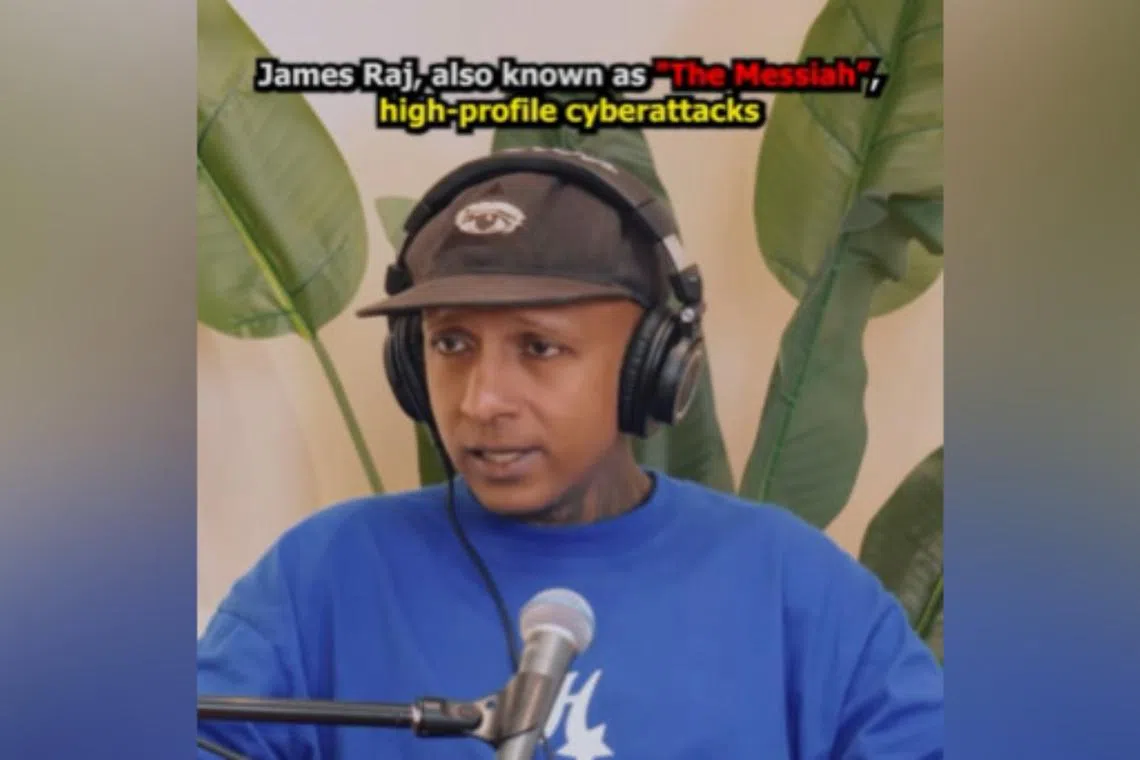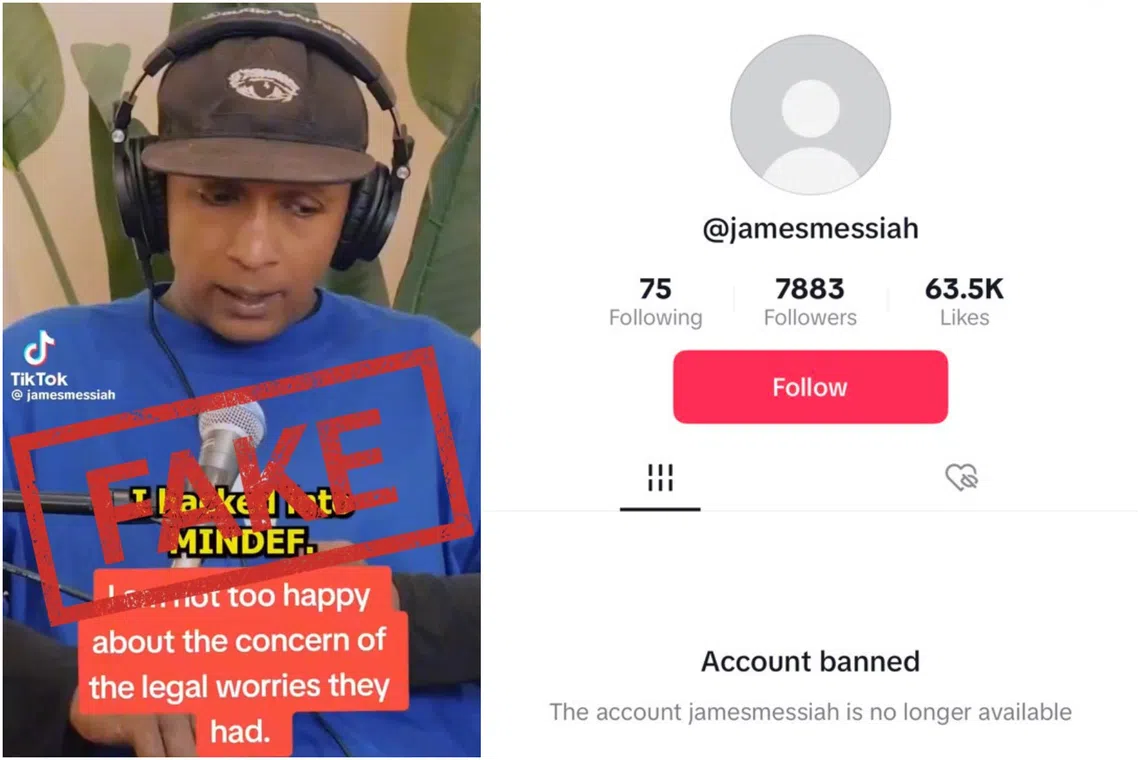Pofma order issued over ex-inmate’s false claims about prison treatment in podcasts
Sign up now: Get ST's newsletters delivered to your inbox

Mr James Raj Arokiasamy had made several false claims in three podcast episodes uploaded to Spotify on Sept 6.
PHOTO: SCREENGRAB FROM DZARISMAIL/INSTAGRAM
SINGAPORE – Former inmate James Raj Arokiasamy made several false claims in three podcast episodes uploaded to Spotify on Sept 6, dealing with his treatment in prison, among other things, said the Ministry of Home Affairs (MHA).
In a statement late on Wednesday, MHA said the false claims made by Mr James Raj, who goes by the pseudonym Messiah, were reproduced on Sept 7 on Instagram posts by Plan B – a local current affairs podcast show. It added that Plan B’s Spotify and Instagram accounts will also be required to put up the correction notices that have been issued.
A correction direction was issued by the Minister for Home Affairs and the Minister for Law under the Protection from Online Falsehoods and Manipulation Act (Pofma), with Plan B having to put up a notice against each of its posts, with a link to the Government’s clarifications.
Additional clarifications published on Wednesday by MHA on government fact-checking website Factually listed six falsehoods put forth by Mr James Raj, 44, along with clarifications about his allegations of abuse during his jail term.
First, in the Sept 6 podcast episodes, he said the authorities did not press charges against him for fear of retaliation. This involved an incident on Nov 29, 2021, when he had a dispute with a drunken customer at a shop.
The facts are that Mr James Raj was assaulted in the incident and fractured his nose. In the ensuing scuffle, he kicked the customer, and was later arrested for affray, said MHA. However, mitigating factors, including the fact that he did not start the fight, meant that he was let off with a warning instead of being prosecuted.
Second, he falsely claimed that he was deprived of human interaction when he was remanded for a period of about two to three years.
MHA refuted the claim, saying he was housed with other inmates in remand, except for a period between March 28 and March 30, 2014, when he was put in an isolation cell for committing disciplinary offences in prison.
MHA said: “During his remand period, he received regular visits from his family members such as his mother and sister, and corresponded with them via letters. He saw his lawyers in prison on at least 12 occasions.”
Mr James Raj also claimed he was imprisoned for protesting against the regulation of Internet censorship. However, MHA said he was, in fact, wanted for absconding from bail after being arrested for drug offences.
He was later arrested in Malaysia and repatriated to Singapore, before being charged for offences linked to drugs and the Computer Misuse Act (CMA), as it was called at the time.
As for claims that he was offered a plea deal by the Government to plead guilty to 39 charges instead of more than 400 charges to cover up his hacking of various government agencies, MHA said he was served a total of only 161 charges. Of these, 158 involved the CMA while three were linked to the Misuse of Drugs Act (MDA).
MHA said: “The prosecution proceeded on 40 charges, of which 39 charges were under the then-CMA and one charge under the MDA. The remaining charges were taken into consideration for the purposes of sentencing.
“This approach is consistent with the prosecution’s practice of proceeding on only a proportion of charges, should an accused person elect to plead guilty instead of claiming trial. This avoids expending judicial resources unnecessarily.”
MHA added that the systems he hacked into were publicly disclosed in the charges filed against him.
Mr James Raj had also claimed to have hacked into Singapore Land Authority (SLA) systems in 2013, as well as Ministry of Defence (Mindef) servers.
MHA said there was no evidence that he hacked into the SLA servers. Investigations were able to establish that he had only scanned for vulnerabilities. It said this was consistent with Mr James Raj’s admissions.
On Monday night, Mindef issued a Facebook post that refuted the claim
In a TikTok video posted on Monday night in response to Mindef’s post, Mr James Raj again claimed he was physically abused while in prison.
MHA, on the Factually website, said: “These claims are untrue and we understand that TikTok has banned James Raj’s TikTok account, @jamesmessiah, and the videos are no longer accessible.”

The TikTok account of James Raj Arokiasamy was banned on Wednesday after he posted videos challenging the Ministry of Defence to prove he had not gained access into its systems.
PHOTOS: MINDEF/FACEBOOK, SCREENGRAB FROM TIKTOK
It added that neither police nor prison officers had assaulted him, nor did they deny him medical treatment when he was in custody or in prison.
He was also treated “professionally and fairly” like any other accused person or inmate.
Mr James Raj also claimed he was beaten up by officers from the Royal Malaysian Police when he was arrested in Malaysia.
MHA said he lodged a police report on Nov 5, 2019. Statements from eight Singapore Police Force and Central Narcotics Bureau officers involved in the arrest said none of them witnessed any mistreatment or assault by Malaysian police.



